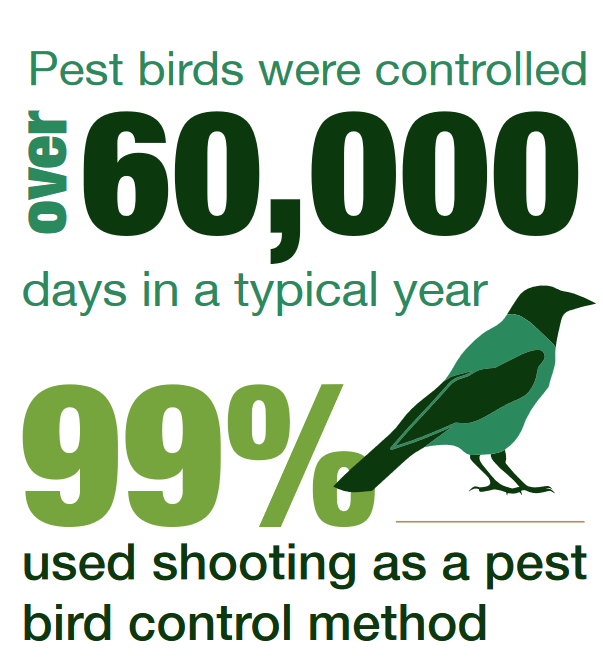It will be very interesting to view the new English general licences which are to be published later today. I honestly have no idea what they will look like.
Last week we had a flurry of activity with our lawyers over the Wild Justice legal challenge of the Welsh general licences which goes to court in mid-December (unless NRW does a DEFRA and caves in).
BASC carried out a survey of their members in Wales back in 2019 to elucidate their use of the general licences in Wales and produced this helpful infographic;
The near-top left hand corner of this infographic – I hate that word – is interesting;

60,000 days (presumably person/days) in a typical year are spent killing species listed on the Welsh general licences (there is no such thing as a ‘pest’ species as far as the law is concerned).
60,000 days? That’s a lot of days. In fact it is a staggering number of days.
Wales has a population of c3m people whereas England (whose general licences will be published today) has a population of c53m – 17 times as many.
So does English wildlife experience over 1 million days of ‘pest’ control each year? Staggering numbers.
And, of course, the Hooded Crow, used by BASC to illustrate the mass killing power of their Welsh membership is not a species listed on the Welsh general licences and if only one of those 60,000 days were used killing the very rare occurrences of this species in Wales it would amount to an offence.
[registration_form]
That only 77% of respondents (BAS members) believe that financial loss would occur if they couldn’t carry on killing birds they regard as a nuisance. And people responding to the survey, who overwhelmingly want this control to continue, will tend to err on the side of saying ‘yes’ to their being financial loss.
On another point: £2.7m estimated financial loss. And to prevent that (estimated) loss they spent 60,000 days wages. That’s £45 saved per day of ‘control’. How much did they pay the shooter for that day of control? Can’t be much less than £45 and could be a lot more. So they haven’t saved any money, plus all the other downside of that ‘control’ like more Lead littering fields and woods. And this is their own figures!
Explanation needed. I can shoot a rabbit that eats my lettuces without needing a licence but not a pigeon. If this is true. How come? Neither are endangered and both get eaten.
Austringer – if you are shooting either I’d recommend that you learn the law about it. And the licences for England for 2021 have just been issued and they aren’t the same as previous licences. If you don’t mind I’m going t spend my time reading them rather than giving one-to-one advice to shooters.
Dear Austringer,
As Mark is otherwise engaged maybe I can help. The licenses are required in order to comply with legislation concerning the protection of birds. It may have escaped your notice but rabbits don’t have wings, not round here anyway. This surprises me somewhat as your nom-de-plume appears to derive from an obsolete term for a Goshawk keeper.
I remain Sir your humble servant etc, etc.
I was interested to see the high percentage of respondents reporting that they ‘control’ rooks. I am aware that rooks can cause some damage to cereal crops through digging up seedlings and through flattening ripe plants to access the ears, but this is offset by the beneficial impact of feeding on invertebrate pests such as tipulid larvae. What the overall net impact is for cereal farmers is hard to assess but they would not obviously be a problem for sheep or cattle farmers. Wales does of course have some arable but as far as I know it is predominantly grazing over much of the country so it is hard to understand why so many of these respondents want to control rooks. I did a quick google search which amongst other things came up with this astonishing exhibition of ignorance and arrogance https://thefarmingforum.co.uk/index.php?threads/rook-control.313970/ I am not sure that the architects of the general licences ever considered “they are driving him mad” as a legitimate justification for killing rooks but hey-ho “AJCC” breezily informs us that “the man on the ground is much better placed to make decisions than inter web masses or chinless suits in faraway cities.”
As we have been told many times before it’s only true countrymen who know what’s right and what’s wrong when it comes to keeping nature in check and townies with their “data” are best off keeping their noses out!